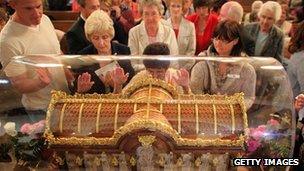Census shows rise in foreign-born
- Published

Christians, like these pilgrims at a church in Warwickshire, are officially on the decrease
The Christian population of England and Wales has fallen by four million to 33.2 million in the past decade, the 2011 census reveals.
It comes as the Archbishop of Canterbury, Rowan Williams, says English cathedral congregations have grown in recent years.
The number of people describing themselves as having no religion rose from 15% to 25% of the population.
The British Humanist Association said it was a "significant cultural shift."
The Church of England said Christianity remained the most populous faith in England, but the fall in people choosing to identify themselves as Christians was a challenge.
Spokesman the Reverend Arun Arora said: "One of the reasons may well be fewer people identifying as 'cultural Christians' - that is, those who have no active involvement with churches and who may previously have identified as Christian for cultural or historical reasons.
"They indicate a changing pattern of religious life in which traditional or inherited identities are less taken for granted than they used to be."
A spokesman for the Catholic Bishops' Conference of England and Wales said: "The overall decrease in the number of self-identifying Christians is consistent with recent social attitude and social value surveys.
"While this is a challenge, the fact that six out of 10 people in England and Wales self-identify as Christians is not discouraging. Christianity is no longer a religion of culture but a religion of decision and commitment. People are making a positive choice in self-identifying as Christians."
The census shows a 7% rise in the number of people living in England and Wales since 2001 - up to 56.1 million. More than half the increase is due to migration.
The census allowed people to declare themselves Christian (all denominations), Buddhist, Hindu, Jewish, Muslim, Sikh, of no religion or to list themselves as belonging to any other faith.
There are 14.1 million people of no religion compared to 7.7 million a decade ago. But Christianity still remains the largest religion at 33.2 million, or nearly six out of 10 people, in spite of registering a fall of just over four million.
It showed a rise in the number of Muslims, with the proportion of the population in 2011 standing at 4.8%, or 2.7 million, up 2% from 1.5 million in 2001.
The Buddhist, Hindu, Jewish and Sikh faiths all registered increases. There are now 817,000 Hindus, a rise of 264,000 since 2001. The Jewish faith also rose by 3,000 over the last decade from 260,000 to 263,000.
'Spiritual beliefs'
Nick Spencer, research director at think-tank Theos, said: "The census measures religious identification, not beliefs or practice. It's about what people call themselves and which group they wish to identify with.
"These figures show that we have a plural religious landscape but that doesn't mean we're atheists. Digging deeper, we see that even those who say they have no religion often have a variety of spiritual beliefs but they don't want to associate these to religious institutions."
In Northern Ireland the number of people describing themselves as Protestant fell from 53% to 48% while the Catholic population went up 1% to 45%.
In the 2001 census 390,000 people nationwide claimed they were Jedi - followers of the faith popularised in the Star Wars films - but that figure fell to 177,000 in 2011.
Only 29,267 people specifically described themselves as atheist while 6,242 put "heavy metal" down as their faith.
The BBC's Religious affairs correspondent Robert Pigott said: "The increasing numbers identifying themselves with non-Christian religions seem partly the result of migration and higher relative birth-rates.
"But they are also explained by a number of campaigns encouraging members of minority faiths to acknowledge their religions, assuming that the bigger their numbers prove to be, the more influence they will have."
Dr Williams, interviewed told Radio Times, said English cathedral congregations had grown dramatically in recent years and he described the idea the Church of England was fading away as a "cliche".
Last year the British Humanist Association ran a campaign to persuade people to tick the "no religion" box.
Chief executive Andrew Copson said: "Religious practice, identity, belonging and belief are all in decline in this country and non-religious identities are on the rise.
"It is time that public policy caught up with this mass turning away from religious identities and stopped privileging religious bodies with ever increasing numbers of state-funded religious schools and other faith-based initiatives. "
The Catholic Church said: "While precise figures are difficult to determine, polling shows that the Catholic population has remained consistent at 9% of the total population for many years.
"Ipsos Mori research for Cafod in 2008 pointed to there being five million Catholics in England and Wales and around one million attend Mass on a weekly basis."